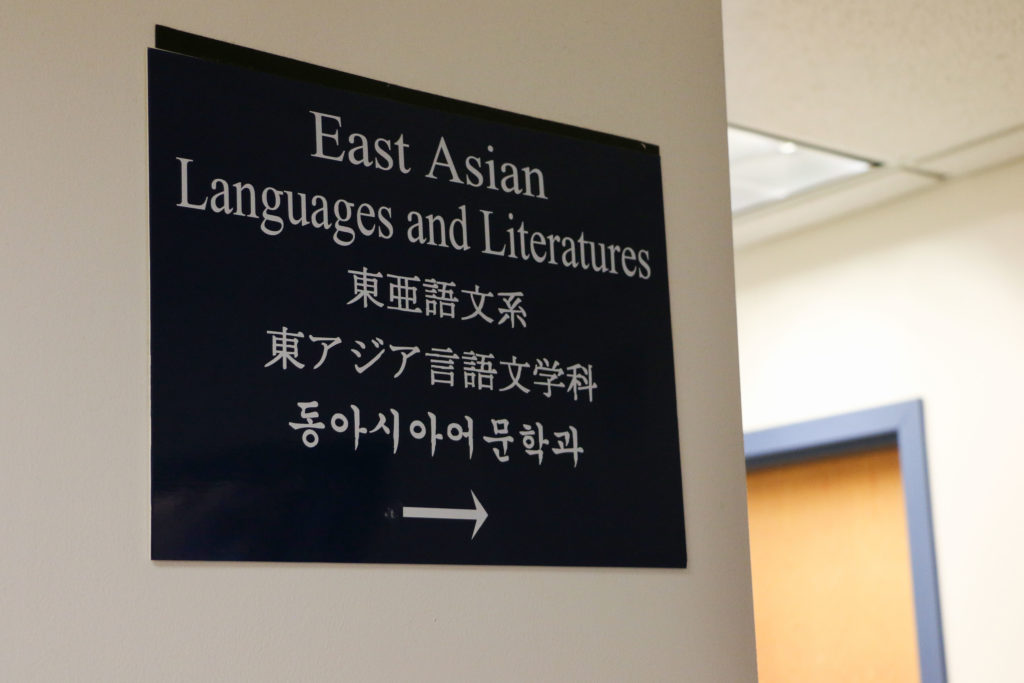The East Asian Languages and Literatures department is expanding its offerings in Korean studies.
The department submitted a proposal for a new Korean languages and literatures major last month and hired two new faculty members who specialize in Korean studies this semester. Faculty in the department said expanding offerings in Korean studies will meet increasing student demand and allow students to explore Korean culture and current events, which have influenced politics in recent months.
Elizabeth Chacko, the associate dean for undergraduate studies in the Columbian College of Arts and Sciences, said the proposal for a Korean studies major was submitted last month, and officials are “considering it.” Chacko declined to say when it would be possible to offer the major.
“We have a minor in Korean with about 20 students, and there appears to be sufficient interest now to consider a major,” she said in an email.
She said the new faculty that were added to the department are trained in Korean literature and language, allowing the program to offer more courses on a diverse range of topics like Korean art, history and business.
Miok Pak, an assistant professor of Korean language and linguistics, said she led the proposal for the new Korean studies major and submitted it to officials at the start of the semester after seeing “how much demand there is from students.” There were 62 students enrolled in Beginner Korean I in fall 2016, but that number increased to 74 the next year and 104 this fall, according to the GWeb Information System.
Pak said the recent “viral” spread of Korean culture, pop music and politics has also boosted student interest in the language.
“There is interest among students who want to continue to more advanced levels and maybe have a minor and major but because of their school situation, they can’t do that,” she said. “I feel like, if we do have it here at GW, we will definitely have more outreach effect within the D.C. area for the students who are interested in Korean studies.”
Pak said the Korean major will require 39 credit hours consisting of four courses on Korean language and literature, four elective upper-level courses and two upper-level courses outside of the program. She said the new major will involve courses like Readings in Modern Korean and Advanced Korean Conversation and Composition.
The department currently offers seven types of Korean studies courses, including Korean Culture Through Film and Introduction to Korean Linguistics.
“Korean studies was the only one in the department that had only the minor, so it seemed sort of incomplete,” she said. “If we have a Korean major, it will complete the department and it will be well-balanced in the department as a whole.”
Shoko Hamano, the chair of the department, said the department has had ongoing discussions with faculty over the past few years about proposing the Korean studies major. She said the department held a unanimous vote in August to officially submit a proposal.
“No East Asian department is complete without a Korean major,” she said. “Korea has been a key player in the history and culture of the region.”
More than half of GW’s 12 peer schools do not offer a minor or major in Korean studies, while four offer Korean minors. New York University is the only one of GW’s peer institutions to offer both a major and minor.
Hamano said the two new faculty members were hired this semester with the assumption that CCAS would soon approve a Korean studies major.
“Understanding Korea is extremely important,” Hamano said. “The interconnections between various regions in East Asia have been dynamic, and Korea has been in the center of this flow of ideas and people, and adding a Korean major is a must for GW as an academic institution.”
Immanuel Kim, a professor of Korean literature and culture, was hired this semester and said he is currently teaching Korean Literature in Transition I. He said student interest in visiting and learning about Korea is increasing, “so we want to keep up with that and provide a platform for them to actually declare a major.”
Kim said Korean studies is attractive to students who are interested in politics and culture, citing student interest in popular music groups like the Bangtan Boys, along with current political affairs between the United States and Korea. He said his position helps to fill “critical program gaps,” since he specializes in North Korean literature and cinema.
“A lot of changes are happening in Asia, and North Korea is constantly on the news,” he said. “It’s important to talk about international relations and all of these national security talks, but also the cultural humanities aspect as well, and to really give North Korea a human face rather than some kind of demonic mask.”
Insung Ko, a teaching assistant professor in the Korean language who was also hired this semester, deferred to Pak, the assistant professor of Korean language and linguistics who submitted the proposal.





